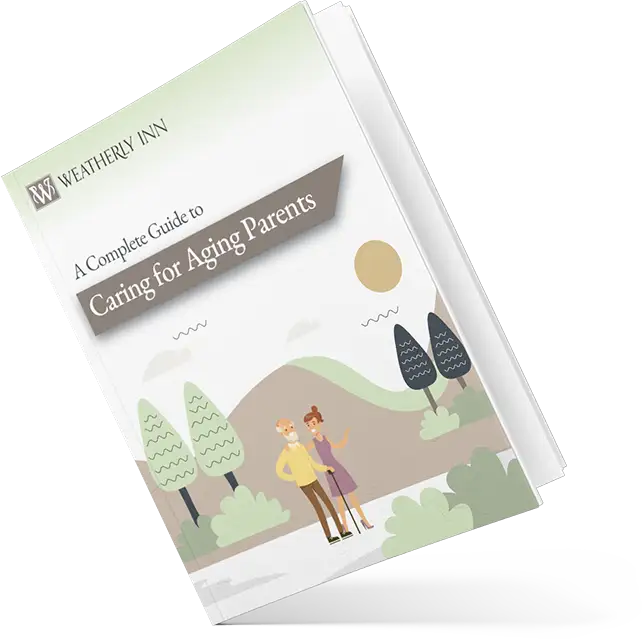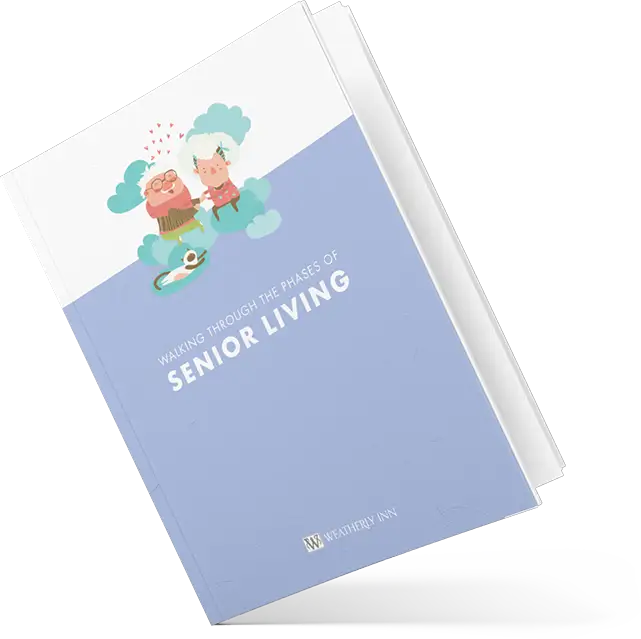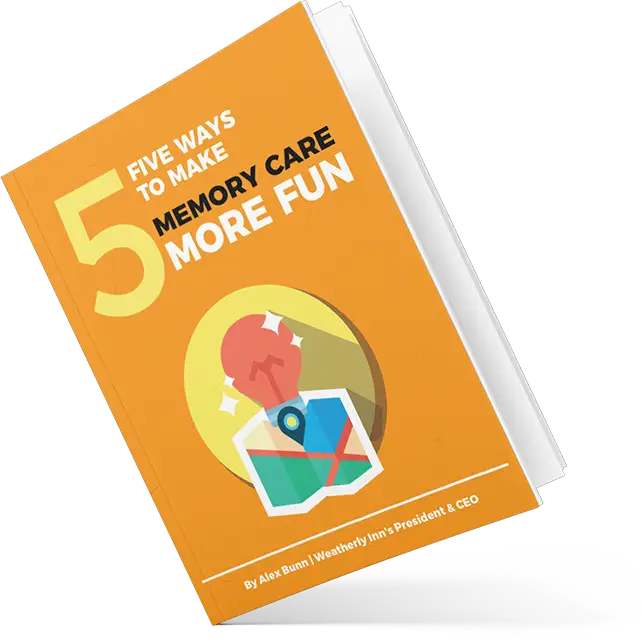May 22, 2020
Being a caregiver for an aging family member can be incredibly challenging. And there comes a point when their care needs become too overwhelming or even impossible for you to handle on your own.
You’re probably reading this article because you suspect it might be time to move an aging parent, grandparent, or spouse into a retirement community (sometimes called a retirement home). You may not be sure if your loved one needs memory care, a skilled nursing facility, assisted living, or another type of senior living situation. And you certainly might not know where to start or what your care options are.
The staff here at Weatherly Inn understands that journey well. The choice between assisted living, memory care, and skilled nursing can seem overwhelming. There are many types of care and various names for the different living options, and sometimes they’re all on the same campus. It’s no wonder folks get confused!
So we’ve put together this article to help you understand the differences between skilled nursing and memory care. We’ll also cover independent and assisted living communities. As always, if you have questions about senior care or dementia care that we don’t address here or you’re just more comfortable asking questions over the phone or in-person, feel free to contact us; we’ll be happy to answer your questions.
Memory Care vs. Skilled Nursing
If you learn one thing from this article, let it be this: assisted living, skilled nursing, and memory care all offer different care services. We’ll address them here and introduce you to other senior living programs that might be appropriate for your loved one.
What Is Memory Care?
A certain amount of memory loss is expected as we age. Even though we can’t see them, our brains are aging right along with our hips, knees, and faces. Just as we might lose some vision, hearing, and mobility as we age, we also lose some of our mental abilities. It’s natural.
However, some folks suffer from more extreme situations, beyond the standard memory loss associated with age. We’re talking about Alzheimer’s disease and dementia.
If your loved one suffers from either of these conditions, life in a memory care home may eventually be the right choice for your family. The best memory care homes are designed to mimic life at home, only with the proper care to address their specific needs. Seniors will eat meals together in a family-like setting around a table, and specially-trained staff members are available to help them with activities of daily living.
These special memory-care programs are thoughtfully created to help folks remember their family, friends, and personal history. Many of these activities are built on reminiscing about the past with other seniors. Activities can include photos, music, and anything else seniors might connect with. The goal is to help slow the progression of their disease. This can be especially helpful when done in the early stages of memory loss.
You may be wondering when you should start talking about memory care options with your family. If so, feel free to check out our blogs discussing when the right time is or how to find a memory care home. Of course, if your loved one has received a clear diagnosis of Alzheimer’s and dementia, it’s likely that home care will not suffice for long. If they haven’t received a clear diagnosis, though, it will be helpful to know a few of the signs that mean it’s the right time for memory care. You may want to consider looking into memory care units if you notice the following patterns in your loved one:
- – Mysterious bruises or injuries that your family member can’t explain
– Frequent wandering (a scary, dangerous habit of Alzheimer’s patients) - – Increased caregiver strain — when it becomes impossible to care for a loved one at home
- – A severe decline in your family member’s health like weight loss, illness, and incontinence
- – Depression, lack of engagement, or avoidance of social activities that your loved one once cared about
- – Other noticeable memory problems such as forgetting to go to appointments, take medication, etc.
Memory care facilities are specially designed to help with these kinds of issues. For example, they’ll usually be well-secured, with gates and locks to help keep residents safe from their urge to wander.
Compared to memory care, skilled nursing is an entirely different level of care.
What Is Skilled Nursing?
Skilled nursing care is more intensive than memory care.

We think part of the confusion that caregivers face when researching elder care comes from the various names used for the same type of care.
The terms “skilled nursing facility” (SNF, or sometimes colloquially called “Sniff”), “nursing home” and “convalescent home” are interchangeable names used to describe a residential facility that provides 24-hour medical care.
Unlike other senior living situations — like independent living and assisted living — skilled nursing homes offer complete medical care around the clock. Folks in a skilled nursing home may have several complex medical issues. Their stay might be temporary if they are healing from a serious accident or surgery, in addition to their health problems. Some things to note:
- – Most often, it will be a physician or other medical professional that recommends this increased level of care.
- – Skilled nursing might be the right choice if your loved one is bedridden or needs full-time nursing care.
- – SNF facilities have come a long way in recent years. They aren’t something to be afraid of anymore.
Once upon a time, skilled nursing communities had atmospheres and reputations much like a hospital. They aren’t all like that anymore! Modern skilled nursing facilities offer more inviting, homey environments. They may provide social opportunities and a variety of activities, in addition to the needed medical care.
- – All skilled nursing homes provide personalized care for folks who need continual medical care. They’ll help with daily living activities like bathing, getting dressed, and medication management.
- – Since skilled nursing provides constant care by highly trained staff members, folks with Alzheimer’s, dementia, and all sorts of other issues can receive the personalized attention needed for their unique needs.
However, your loved one might not need this intense level of care! After a call to Weatherly, many caregivers are happy to discover their family member would do just fine in either an assisted living community or an independent senior living community. So let’s talk about those!
What Is Assisted Living?
Assisted living communities are meant to provide personal care, limited health care, and help with daily activities. Modern assisted living has come a long way too! It is one of the best care options for seniors that need help with day-to-day activities, but still enjoy a private room and their own living space. Their goal is to promote independence and a high quality of life. If your loved one has a good memory, is still mobile, and can handle some of their daily tasks (like eating and dressing) without much help, then assisted living is the right choice.
The best assisted living homes will provide restaurant-like dining experiences, transportation to special events, and socialization opportunities.
So when you are trying to discern between assisted living or memory care, just remember that the key differences are in the level of care and attention necessary. It may be possible that your loved one does not even require assisted living. In that case, you may want to consider “senior living” or “independent living,” the lowest level of personal care for our elderly loved ones.
What Is Senior Living / Independent Living for Seniors?
If your family member is entirely mobile, takes part in an active social life, manages their medications (easily), and enjoys an independent lifestyle with other older adults, senior living is probably the best choice for them.
At senior living communities, life is less about medical attention and more about a vibrant, engaging lifestyle. Excellent independent living homes will offer a variety of entertainment, social outings, and special events. Modern senior living homes provide a consistently engaging and fun way of living for residents from movie nights to senior yoga.
In the end, caregivers will find it’s the right time for assisted living, memory care, or skilled nursing when a family member will experience a better quality of life in that specialized setting. Whether your loved one is entirely independent, frighteningly forgetful, or entirely bedridden, the peace of mind you’ll have when they’re getting the right care is worth it.
You’re not alone in the decision-making either. We’re always ready to help you decide if this is the right time for eldercare. And you may have other questions such as how to fund your loved one’s care with Medicaid or Medicare. In any case, we encourage you to reach out to us today if you’d like to learn more. We won’t give you a high-pressure sales pitch, we promise. We’re just here to answer any questions you have and find the best situation possible for your loved one.



